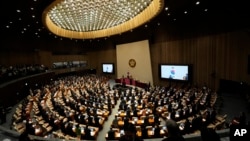President Yoon Suk Yeol boycotted the formal opening of South Korea’s parliament Monday as his squabbles with the opposition deepen over allegations of wrongdoing by top officials and his wife.
It’s a tradition for South Korean presidents to deliver a speech at opening ceremonies for National Assembly sessions, and Yoon is the first to skip the event since the country’s transition from a military dictatorship to democracy in the late 1980s.
Yoon, a conservative who narrowly won the election in 2022, has struggled to navigate a parliament controlled by liberals who have stymied his agenda and called for investigations into allegations of corruption and abuse of power involving his wife and government officials.
President Yoon also faces declining approval ratings as concerns grow over his government’s ability to deal with a worsening job market, soaring household debt and a prolonged strike by thousands of doctors that is straining medical services.
Asked about his decision to skip the legislature’s opening ceremony, Yoon’s office said lawmakers must first “normalize the National Assembly, which over issues demands for special prosecutor investigations and impeachments,” before inviting Yoon.
A senior presidential official, who spoke on the condition of anonymity during a background briefing, said it was difficult for Yoon to attend when lawmakers were expected to greet him with “verbal abuse and picketing demonstrations.”
“They aren't hesitating to call the president's family member a murderer and conspiracies about martial law are continuing to circulate in the National Assembly," she said.
Jo Seoung-lae, spokesperson of the main opposition Democratic Party, said Yoon’s refusal to attend the ceremony displayed his “arrogance” and disregard for the assembly’s role to check and balance the executive branch.
“It’s impossible to produce results in national governance without having respect for the National Assembly,” assembly Speaker Woo Won-shik said during the opening ceremony as he lamented Yoon’s absence.
Following parliamentary elections in April in which the liberals extended their majority, the current assembly began meeting in May. But its official opening ceremony was delayed for months because of political bickering.
Opposition lawmakers are pushing for an investigation by special prosecutors into allegations that top government and military officials tried to cover up the circumstances surrounding the death of a marine who drowned during a search for flood victims in 2023.
They want another independent investigation into allegations that Yoon’s wife, Kim Keon Hee, was involved in stock price manipulation and violated the country’s antigraft law by receiving a luxury handbag from a Korean American pastor. Yoon has denied any legal wrongdoing by his wife.
In August, Yoon’s office angrily demanded an apology after Democratic Party lawmaker Jeon Hyun-heui labeled Kim as a “murderer” over the death of a senior official from the Anti-Corruption and Civil Rights Commission, who was reportedly involved in the commission’s review of the handbag scandal.
Opposition lawmakers had raised suspicions on whether the commission was pressured into closing the review in June, when it concluded that the antigraft law provides no grounds for punishment for the spouses of public officials. The death of the former commission official, who was reportedly found with a note, is still being investigated.
Yoon in May and July rejected consecutive bills calling for special prosecutors to investigate the marine’s death, describing the allegations as groundless and politically motivated.
Yoon and his party also criticized the opposition’s move to hold a parliamentary hearing in July to address online petitions signed by tens of thousands calling for his impeachment. South Korea’s Constitution limits a president to a single five-year term, so Yoon cannot seek reelection.








